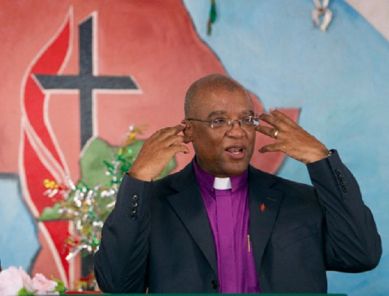Top UMC Court Reinstates Texas Bishop, Says Committee Violated Fair Process

The top court in the United Methodist Church has reinstated the Bishop W. Earl Bledsoe, saying a regional committee in Texas earlier this year introduced flaws that were "fatal" to the process that led to his forced retirement.
The Judicial Council said its decision only addressed the process, not the merits of the findings or conclusions of the South Central Jurisdictional Committee on Episcopacy and the affirmation given to the decision by the 2012 South Central Jurisdictional Conference.
The Council said that actions by the South Central Jurisdictional committee on Episcopacy included "numerous errors in violation of the principles of fair process and the inability to articulate what constitutes "best interests of the bishop and/or the Church."
"These decisions are null, void, and of no effect," the Council wrote in its decision.
The Council ordered that the bishop be "immediately reinstated to his rightful status as an active bishop of The United Methodist Church."
The council said he was entitled to an immediate assignment to an Episcopal area within the South Central Jurisdiction, with restoration of all status, salary and benefits retroactive to September 1, 2012, less anything related payments already made.
In July, after the committee's closed-door hearing involving the bishop it voted by a 24 to 4 margin to place him in involuntary retirement. A committee leader said at the time there were concerns about the bishop's administrative abilities, not his spiritual leadership.
Bishop Bledsoe appealed the matter to the Judicial Council in July, shortly after the committee's decision, on the basis that the process is not spelled out in the Book of Discipline.
The Council discussed the committee's use of the phrase "best interests of the bishop and/or the Church" when it decided to retire Bishop Bledsoe. The Council said the committee's definition "has no legislative warrant."
In addition, among other reasons, the committee's "eventual working definition" focusing on professions of faith and worship attendance" did not have "widespread ecclesiastical endorsement as sufficient standard for determining 'best interests."
Council Scrutiny on Process
The Judicial Council said it reviewed the process in light of fairness, equity, justice, legality, and timeliness of the process.
The Judicial Council said Rev. Bledsoe received a statement with reasons for a hearing by the committee 20 days before it was to be held, not the 30-day written notification that is required.
"The failure of the Committee to provide its Statement of Reasons at the time it gave notice of the hearing was a violation of the fair process mandate and of the required aspects of [the section in the Book of Discipline] that requires a 30-day notice," the Judicial Council said.
The Judicial Council further faulted the SCJ College of Bishops for a violation of the separation of powers in the Book of Discipline.
"It is inappropriate for the College of Bishops to provide advice, counsel, direction, or assistance to a committee on episcopacy that is considering any involuntary process against an active bishop," the Council wrote.
The Council said the committee included in its proceedings certain provisions and actions that apply to complaint processes, investigations and trials.
"None of these is relevant. Worse these decisions led to disruptions in fair process by confusing the matters of who was required to do what, by when.